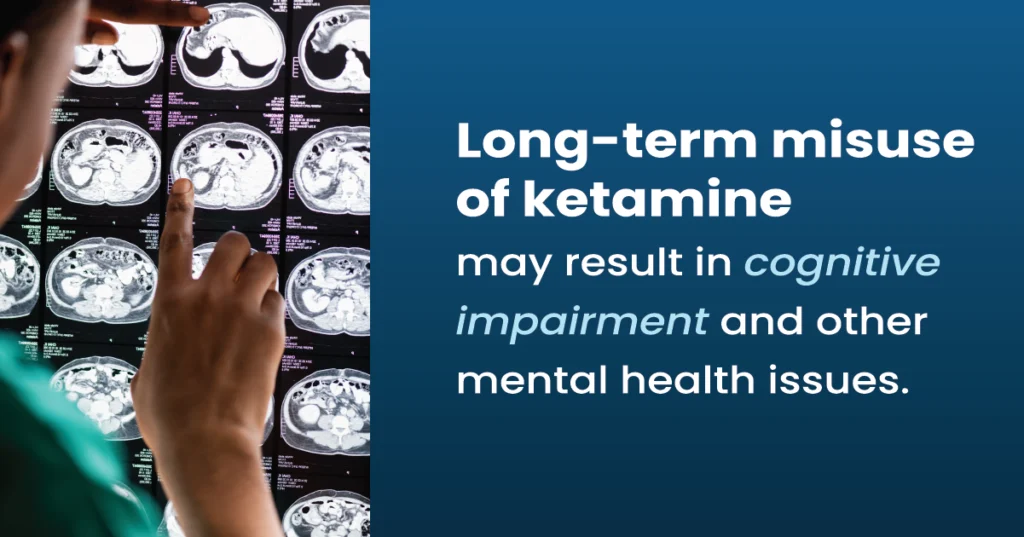Ketamine, originally developed as an anesthetic, has gained popularity as a recreational drug, leading to a concerning rise in ketamine abuse. Individuals misusing ketamine may exhibit a range of physical, psychological, and behavioral signs.
From disorientation and hallucinations to impaired motor function, recognizing these indicators is pivotal for addressing the issue promptly.
Key Takeaways
Ongoing research explores its therapeutic use in treating depression and other mental health conditions. Here’s what you need to know:
- Ketamine, a dissociative anesthetic, is used in medical settings for anesthesia and pain management.
- Its potential for abuse as a recreational drug can lead to hallucinations and altered perceptions.
- Long-term misuse of ketamine may result in cognitive impairment and other mental health issues.
Contact The Haven Detox-Little Rock at (501) 271-3342 for information and recovery assistance to embrace long-term wellness.

Understanding Ketamine
Ketamine is a dissociative anesthetic drug initially developed for medical use, primarily as an anesthetic in veterinary and human surgery. It belongs to the class of drugs known as NMDA receptor antagonists.
Ketamine is known for inducing a trance-like state, providing pain relief, sedation, and amnesia. In medical settings, it is commonly used for surgeries and as an emergency anesthetic in situations where other anesthetics may not be suitable.
Rise of Ketamine Abuse
Despite its medical applications, ketamine has gained popularity as a recreational drug, leading to misuse and abuse. The misuse of ketamine has been associated with its hallucinogenic effects and its ability to induce a dissociative state, altering perception and sensory experiences.
Individuals may misuse ketamine for its euphoric and psychedelic effects, seeking a sense of detachment from reality. The rise of ketamine misuse is concerning, as it poses various health risks, including physical and psychological harm.
Inappropriate use of the drug can lead to addiction, cognitive impairments, and negative effects on mental health.
Symptoms of Ketamine Abuse
Abusing ketamine can lead to various physical and psychological symptoms. It’s important to note that the severity of symptoms can vary among individuals.
Here are some common physical and psychological symptoms associated with ketamine abuse:
Physical Symptoms
- Impaired coordination and motor function
- Elevated blood pressure and heart rate
- Nausea and vomiting
- Bladder and urinary tract issues
- Insomnia and disturbances in sleep patterns
Psychological Symptoms
- Hallucinations and dissociation from reality
- Cognitive impairment and memory loss
- Mood swings and emotional instability
- Anxiety and panic attacks
- Impaired judgment and decision-making
Individuals experiencing these symptoms or witnessing them in someone else to seek professional help. Substance abuse treatment programs and mental health support can assist in overcoming ketamine abuse and addressing associated psychological issues.
Risks and Effects Of Ketamine Abuse
Ketamine use can have immediate effects and long-term consequences. It’s important to note that the information provided here is based on general patterns observed in ketamine abuse, and individual experiences may vary.
Immediate Effects of Ketamine Abuse
- Hallucinations and Dissociation: Ketamine is known for inducing hallucinations and dissociative states. People may experience a sense of detachment from reality, altered perceptions of time and space, and vivid visual or auditory hallucinations.
- Impaired Coordination and Motor Function: Ketamine can cause motor impairment and coordination difficulties. Young people may have difficulty moving, walking, or maintaining balance.
- Nausea and Vomiting: Vomiting and nausea are common immediate side effects of ketamine use. These symptoms can contribute to a sense of disorientation and discomfort.
- Increased Heart Rate and Blood Pressure: Ketamine can lead to increased heart rate and blood pressure, which may pose risks for individuals with pre-existing cardiovascular conditions.
- Confusion and Cognitive Impairment: Cognitive functions, such as memory, attention, and decision-making, can be impaired during ketamine use, leading to confusion and difficulty processing information.
Long-Term Consequences Of Ketamine Abuse
- Urinary and Bladder Issues: Chronic ketamine abuse is associated with urinary tract and bladder problems, including inflammation, ulceration, and, in severe cases, a condition known as ketamine-induced cystitis.
- Cognitive Impairment: Long-term use of ketamine may contribute to persistent cognitive deficits, including memory loss, attention problems, and difficulties with learning.
- Psychological Dependence: Regular use of ketamine can lead to psychological dependence, where individuals may feel a strong compulsion to continue using the drug despite negative consequences.
- Mental Health Issues: Ketamine abuse is associated with an increased risk of mental health issues, including anxiety, depression, and psychotic symptoms. Ketamine may exacerbate pre-existing mental health conditions.
- Tolerance and Addiction: Continued use of ketamine can lead to tolerance, requiring higher doses to achieve the desired effects. This can increase the risk of addiction, where individuals may find it challenging to stop using the drug.
- Social and Occupational Consequences: Ketamine abuse can negatively impact relationships, employment, and overall functioning in daily life. Individuals may face social isolation and difficulties maintaining responsibilities.
Getting Help for Ketamine Abuse
If you or someone you know is struggling with ketamine abuse, it’s crucial to seek professional assistance.
Here are some steps you can consider:
Speak to a Healthcare Professional
Reach out to a healthcare professional, such as a counselor or a doctor, who can guide treatment options. They can assess the situation and recommend an appropriate course of action.
Detoxification
For people with severe ketamine dependence, a supervised detox process may be necessary. This process helps manage withdrawal symptoms and cravings of the club drug in a safe environment.
Therapy
Behavioral therapy and counseling can be beneficial in managing the underlying issues contributing to substance abuse. Cognitive-behavioral therapy (CBT) and motivational enhancement therapy (MET) are effective therapeutic approaches.
Rehabilitation
Depending on the severity of the addiction, inpatient or outpatient treatment programs may be recommended. These programs offer structured support and therapy to help individuals overcome ketamine use disorder.
Remember, receiving assistance is a courageous step, and resources are available. If you or someone you know is struggling with ketamine abuse, it’s essential to reach out to healthcare professionals or addiction specialists for personalized advice and assistance.
Frequently Asked Questions (FAQ)
Can ketamine be addictive when given for pain relief?
Ketamine, initially administered for pain relief, can lead to addiction. Its dissociative effects and popularity as a recreational drug contribute to physical dependence, causing potential damage to the mind and body.
In addition, large doses and long-term use may result in ketamine addiction, requiring detox and intervention from addiction centers to address drug abuse. The powder form further amplifies the risks associated with its addictive nature.
What are the risks of ketamine?
Ketamine poses risks in social settings, leading to respiratory depression, high blood pressure, and psychological addiction. High doses may cause irreversible damage, severe depression, and abdominal pain. Ketamine overdose can result in heart attacks and infectious diseases.
Recognizing signs of ketamine addiction is crucial, and seeking medical advice at treatment facilities can help patients facing ketamine-related issues.
What are some of the symptoms of ketamine withdrawal?
Pharmaceutical ketamine, popular in veterinary medicine, poses risks. Ketamine withdrawal symptoms include dissociative effects, physical dependence, and irreversible damage with long-term use. Large doses and regular ketamine use may lead to substance use disorder.
According to reports from the drug administration, environmental factors and support from family members are crucial in ketamine addiction treatment.
Begin Your Healing With The Haven Detox-Little Rock
Take the first step towards a ketamine-free life with The Haven Detox-Little Rock.
Our comprehensive approach combines detoxification and residential treatment, providing a supportive environment for your recovery journey. Our team of experienced therapists goes beyond the ordinary, offering personalized counseling and evidence-based therapies tailored to address underlying causes of addiction to embrace lasting healing.
Trust our experienced team to guide you through every step, ensuring a holistic recovery. Call us at (501) 271-3342 today.





